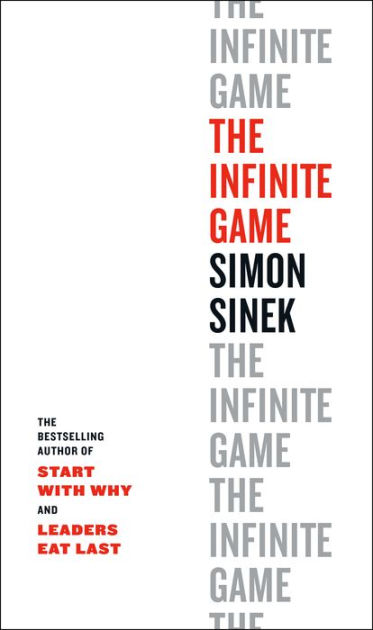INSIDER: The Infinite Game
Maria Morales Menendez, MBA
 In a world where finite and infinite games exist, one must play in a finite and infinite way, respectively. Finite games have a beginning, middle, and an end, with known players and fixed rules—think, a baseball game. Infinite games are quite the opposite. One can change how they play the game at any time and for any reason. The game of business has no finish line and no winner, players simply drop out (acquisition or bankruptcy). The same can be said about life or a career. Achievements occur throughout, but again, with no way of “winning.” One must learn to play the right way, in the right game. When we lead with a finite mindset in an infinite game, the outcomes are a decline of trust, cooperation, and innovation. Like all infinite games, in the game of life, the goal should never be to win, but instead to perpetuate the game. The focus of Simon Sinek’s The Infinite Game revolves around five essential practices to adopt an infinite mindset: advance a just cause, build trusting teams, demonstrate the courage to lead, study worthy rivals, and prepare for existential flexibility. This article summarizes how to adopt these practices as a leader in order to perpetuate the infinite game of business—which includes real estate.
In a world where finite and infinite games exist, one must play in a finite and infinite way, respectively. Finite games have a beginning, middle, and an end, with known players and fixed rules—think, a baseball game. Infinite games are quite the opposite. One can change how they play the game at any time and for any reason. The game of business has no finish line and no winner, players simply drop out (acquisition or bankruptcy). The same can be said about life or a career. Achievements occur throughout, but again, with no way of “winning.” One must learn to play the right way, in the right game. When we lead with a finite mindset in an infinite game, the outcomes are a decline of trust, cooperation, and innovation. Like all infinite games, in the game of life, the goal should never be to win, but instead to perpetuate the game. The focus of Simon Sinek’s The Infinite Game revolves around five essential practices to adopt an infinite mindset: advance a just cause, build trusting teams, demonstrate the courage to lead, study worthy rivals, and prepare for existential flexibility. This article summarizes how to adopt these practices as a leader in order to perpetuate the infinite game of business—which includes real estate.
THINK POINT #1: Create a Just Cause
A just cause is not the same as our why. A why comes from the past, a statement of who we are, and it cannot be changed. Conversely, a just cause is a vision for a future state that does not yet exist—one so appealing that people are willing to make sacrifices in order to help advance toward that vision. A company with a just cause allows for an employee to like their job some days, but love their job always. This is about creating a future that employees hope to live in and will commit to help build. In order to create an impactful just cause, it must be:
- For something – affirmative, optimistic and tell us what we stand for
- Inclusive – open to all those who would like to contribute
- Service oriented – for the primary benefit of others
- Resilient – able to endure political, technological and cultural change
- Idealistic – big, bold, and ultimately unachievable.
The quick-serve salad company, Sweetgreen, stands for something bigger than selling salads with their just cause: “to inspire healthier communities by connecting people to real food.” Real food to Sweetgreen is defined as locally sourced and whole ingredients. Their employees feel connected to their jobs on a deeper level, as their goal is to make communities healthy through the products they create—ultimately, a truly unachievable goal.
In order to further solidify this, think of sales in real estate. A finite-minded company offers products they think they can sell to people, while the infinite-minded company offers products people want to buy, and that make their lives better. The former description is focused primarily on how the sale of those estates benefit the company, while the latter is primarily focused on how the products benefit those who buy them. When creating a just cause, one must connect employees to the benefit of others.
A written cause should work like a compass and guide the business model, not the other way around. Money is the fuel to advance a cause or a result, but is not the cause itself. With an effective just cause as a compass, each succession of leaders, their gaze looking beyond the horizon, can more easily navigate the technologies, politics, and cultural norms of the day without the founder present. Sinek states that without a sense of purpose, no company, either public or private, can achieve its full potential.
Overall, the keeper and enforcer of this cause should be top leadership. Infinite-minded leaders will work hard to look beyond the financial pressures of the current day and put people before profit as often as possible, because they believe in the just cause and longevity of the company. Additionally, though these leaders may get rich while doing what they’re doing, they aren’t doing it to get rich. They’re doing it because they believe in the just cause.
THINK POINT #2: Establish Trusting Teams and the Courage to Lead
Sinek states, “Leaders are not responsible for the results; leaders are responsible for the people who are responsible for the results.” An infinite-minded leader in any industry knows it is important to nurture trusting teams and a healthy environment, which create a community of employees that believe in their leaders, even when they make mistakes or take unexpected turns. Trust is built over time when leaders put people before profits and act in a way that lives up to those words.
In his book, Sinek explains that a world-famous trapeze artist would never attempt a brand new, death-defying act for the first time without a net. In the same way, we cannot find the courage to lead without the help of others. Those who believe what we believe are our net. To demonstrate the courage to lead, a fundamental idea must be understood—hard decisions are never made by great women or great men, they are done by great teams, great partnerships, and great people who decided to stand together with deep trust and common cause.
THINK POINT #3: Use Existential Flexibility and Worthy Rivals
In the infinite game of business, there is no winner, and therefore being the best is a “fool’s errand,” since there can be multiple players who do well at the same time. Instead of viewing competitors as those who must be beat, a worthy rival can reveal to us where we can make improvements. Having a worthy rival provides leaders humility, agility, and a single point of focus for strategies to be developed and resources to be allocated. Where an organization once fought primarily for the good of others and for the good of the cause, without a worthy rival, organizations are more likely to fight primarily for the good of themselves. Additionally, worthy rivals are the best way to improve and adapt before it’s too late.
Adapting can sometimes be an extreme disruption to a business model or strategic course in order to more effectively advance a just cause, otherwise known as an existential flex. Early in his career, Steve Jobs decided to flex and change Apple’s business model with the development of the MacIntosh. He decided this after encountering new emerging technology that could turn the organization on its head. Jobs stated, “Better we blow it up than someone else.” He invested in the company and developed the first user-friendly computer, which became the standard for Apple’s competitors. A look at worthy rivals gives an infinite-minded leader a sense of infinite vision and the need for strategic shifts—even extreme ones. The motivation for an infinite-minded player to flex is always to advance the just cause of the organization. With a community of trusting employees also dedicated to the cause, it is clear to them why the flex was made, and passion for the cause is only reignited.
Conclusion
 In the world of real estate and business overall, rules aren’t set, players aren’t always clear, and there isn’t a “winner.” The only way to succeed in the infinite game is to perpetuate the business far beyond your time. Leaders must rethink decisions that only affect the short-term success of a company and, instead, be guided by a just cause and make decisions for the longevity of the company. In real estate, this means putting your people above profits, establishing a trusting environment, becoming self-aware through your rivals, and having the courage to flex when necessary for the cause. As you shift to an infinite mindset, it’s key to remember:
In the world of real estate and business overall, rules aren’t set, players aren’t always clear, and there isn’t a “winner.” The only way to succeed in the infinite game is to perpetuate the business far beyond your time. Leaders must rethink decisions that only affect the short-term success of a company and, instead, be guided by a just cause and make decisions for the longevity of the company. In real estate, this means putting your people above profits, establishing a trusting environment, becoming self-aware through your rivals, and having the courage to flex when necessary for the cause. As you shift to an infinite mindset, it’s key to remember:
- We don’t get to choose whether a particular game is finite or infinite;
- We do get to choose whether or not we want to join the game;
- Should we choose to join the game, we can choose whether we want to play with a finite or an infinite mindset.
Sinek ends his novel with a question: “We only get one choice in the Infinite Game of life. What will you choose?”
. . . . . . . . . . . . . . . . . . .
Recommended Reading
Sinek, Simon (2019), The Infinite Game, Penguin Random House, LLC.
. . . . . . . . . . . . . . . . . . .
About the Author
Maria Morales Menendez, MBA
Baylor University
Maria Morales Menendez earned her Bachelor of Science in Biosystems Engineering from the University of Kentucky and her MBA with a Healthcare concentration from Baylor University. Maria currently serves as an Administrative Fellow at Tenet Healthcare’s Palm Beach Group and Delray Medical Center.